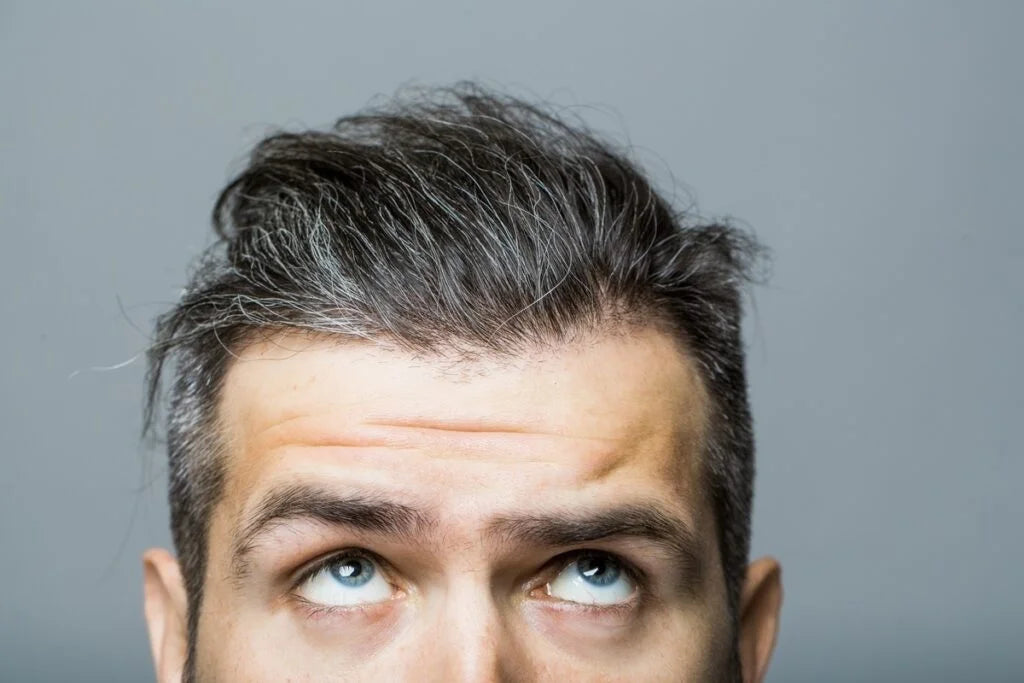
Graying hair is a natural biological process that is often associated with aging. This process, associated with changes in the structure and functioning of hair follicles, can lead to a loss of hair pigmentation. While our bodies produce melanin, the pigment responsible for hair color, as we age, its production naturally decreases. This reduction leads to the graying process, which is the slow transition of hair from dark to silvery white.
The rate and timing of when hair begins to go grey varies depending on many factors, including genetics, diet, stress, and overall health. Regardless of the cause, the mechanism of the greying process remains the same. The cells responsible for producing melanin begin to lose their efficiency, causing a decrease in the pigment content of the hair follicles. As a result, the newly growing strands become lighter and lighter until they reach the final white color that is characteristic of grey hair.
Genetics and gray hair
Does genetics cause gray hair? Absolutely—genetics plays a major role in determining when graying begins. Scientific research shows that if your parents started going gray early, you are also more likely to experience early graying. This is because certain genes inherited from your parents regulate when your body reduces melanin production.
However, hair graying is a complex process, and genetics is only one part of the equation. While some people have a genetic predisposition to gray earlier, lifestyle, diet, and habits also play significant roles. For instance, if you live a high-stress lifestyle, you may start graying earlier than your parents did. Understanding the genetic influence can help you better manage and possibly delay the onset of gray hair.
The Impact of Lifestyle on Hair Color
Your lifestyle has a significant impact on the graying process. Factors like diet, stress, and habits can accelerate the appearance of gray hair. A diet rich in antioxidants—such as vitamins E and C—can support melanin production and help delay graying. On the flip side, a poor diet and habits like smoking or excessive alcohol use can speed up pigment loss.
Chronic stress is another major factor linked to gray hair. It triggers the release of stress hormones that can negatively affect hair follicles, leading to pigment loss. A healthy lifestyle—balanced diet, regular exercise, and effective stress management—can help slow the graying process and benefit your overall well-being.
Does Stress Cause Hair to Gray Faster?
Does Stress Cause Hair to Gray Faster?
More and more studies are confirming the link between stress and graying hair. Both physical and emotional stress can accelerate the process by affecting the functioning of hair follicles. Here’s how:
- Stress increases cortisol levels—a hormone that disrupts the hair growth and pigmentation cycle. Elevated cortisol can lead to premature graying.
- Stress weakens the immune system, potentially causing inflammation in the scalp, which can interfere with pigment production.
- Stress often leads to poor nutrition, which deprives the body of essential nutrients needed for healthy, pigmented hair.
While stress is an unavoidable part of life, it can be managed through a healthy routine that includes a good diet, regular exercise, and techniques like meditation or breathing exercises. Reducing stress not only helps delay graying but also improves overall health.
Hormones and Changes in Hair Color
Hormones play a key role in hair graying. They regulate many functions in the body—including hair health and color. One of the main hormones involved is cortisol, commonly known as the stress hormone. Elevated cortisol levels—caused by emotional stress, physical strain, or illness—can affect melanin production and speed up graying.
Hormones also influence the immune system. Hormonal imbalances can lead to inflammation, which impacts scalp health and hair follicle function. This means hormones, especially those related to stress and inflammation, greatly influence the graying process. Monitoring and balancing your hormone levels—through diet, exercise, and stress management—may help slow it down.
Methods to Delay Graying Hair
There are several ways to delay graying. Eating foods rich in vitamins A, B, and E—such as nuts, fish, eggs, and whole grains—can support melanin production and help preserve your natural hair color for longer.
Stress reduction is also critical. Activities like yoga, meditation, and regular physical exercise can help regulate hormones, improve blood flow, and support hair follicle health. Incorporating these habits into your daily life may delay graying—though it's important to remember that this is a natural process and not something to feel overly worried about.